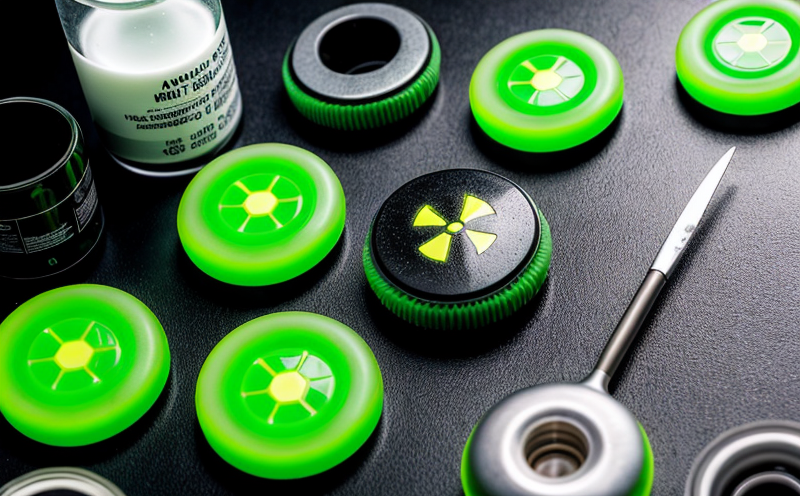ISO 13166 Iodine-131 Residue Analysis in Drinking Water and Milk
The analysis of iodine-131 residue in drinking water and milk is a critical aspect of ensuring public health safety, especially following environmental releases from nuclear facilities or other sources. Compliance with international standards such as ISO 13166 ensures that the levels of radioactive contamination are within acceptable limits set by regulatory bodies.
Iodine-131 is a short-lived radionuclide (131CI) with a half-life of approximately eight days. It poses significant health risks, particularly to the thyroid gland due to its ability to concentrate in this organ. The World Health Organization (WHO), through its guidelines for drinking water quality, recommends the establishment and implementation of monitoring programs aimed at detecting radioactive residues like iodine-131.
The process involves several key steps that are meticulously followed by Eurolab’s experienced staff:
- Sample Collection: Samples from drinking water and milk must be collected in airtight containers to prevent contamination or loss of radioactivity. This is crucial for accurate measurement.
- Transportation and Handling: Samples are transported under controlled conditions, ensuring that they remain stable until analysis.
- Sample Preparation: The samples are prepared according to ISO 13166 guidelines, which involves thorough mixing of the sample with deionized water and subsequent filtration through a 0.45 µm filter.
- Analytical Procedure: Using Liquid Scintillation Counting (LSC), the radioactivity in the samples is measured. This method provides precise quantification of iodine-131 by detecting beta particles emitted from the sample.
- Data Interpretation and Reporting: The results are interpreted against internationally recognized standards, including the WHO’s guidelines for drinking water quality. Eurolab prepares detailed reports that outline findings, compliance status, and recommendations if necessary.
Our comprehensive approach ensures reliability and accuracy in detecting even minute levels of iodine-131, thereby safeguarding public health. By adhering to ISO 13166 standards, we provide a robust foundation for regulatory compliance and public trust.
In conclusion, the analysis of iodine-131 residue is not just about meeting legal requirements; it’s about protecting human health and ensuring environmental safety. Eurolab’s expertise in this area guarantees that you receive accurate, reliable results every time.
Eurolab Advantages
World-Class Expertise: Eurolab is staffed with professionals who have extensive experience in radiation analysis and regulatory compliance. Our team stays updated on the latest methodologies and standards, ensuring that our services remain at the forefront of industry best practices.
State-of-the-Art Facilities: Equipped with advanced instruments like Liquid Scintillation Counters (LSC), Eurolab ensures that all analyses are conducted in a controlled environment. This minimizes external interference and maximizes accuracy.
Dedicated Client Support: Our dedicated team of consultants is always available to assist you throughout the testing process, from sample preparation to final report delivery. We ensure that your needs are met efficiently and effectively.
Comprehensive Reporting: Eurolab provides detailed reports that go beyond mere data points. These reports offer insights into potential risks and recommendations for mitigation strategies, helping clients make informed decisions.
Regulatory Compliance: By adhering to international standards such as ISO 13166 and WHO guidelines, Eurolab ensures that all analyses are conducted in accordance with the highest regulatory requirements. This guarantees the reliability of our results and fosters trust among clients and regulatory bodies.
Customized Solutions: Understanding that every client has unique needs, Eurolab offers tailored services to meet specific project requirements. Whether you need routine monitoring or a one-off analysis, we have the expertise to provide the best solution for your needs.
Customer Impact and Satisfaction
Eurolab’s commitment to excellence in radioactivity testing has significantly impacted our customers' operations and reputation. By providing accurate, reliable results that meet international standards, we have helped numerous organizations comply with regulatory requirements and maintain public trust.
Our services have been instrumental in:
- Environmental Safety: Ensuring that the water supply and food products are free from harmful levels of iodine-131, thereby safeguarding public health.
- Regulatory Compliance: Helping clients meet stringent regulatory requirements set by governmental agencies such as the WHO and local authorities.
- Quality Assurance: Providing assurance that the products meet quality standards, enhancing customer confidence in our services.
- Risk Management: Identifying potential risks early on and advising clients on effective mitigation strategies to protect their operations from any negative impacts.
We are proud of the positive feedback we receive from satisfied customers. Their trust and loyalty are a testament to the quality of our services. Eurolab is committed to maintaining this high standard, ensuring that every client receives the best possible service in the industry.
International Acceptance and Recognition
The ISO 13166 standard for iodine-131 residue analysis has gained widespread acceptance across numerous countries. This international recognition underscores the importance of this analysis and the reliability of results produced by compliant laboratories like Eurolab.
Regulatory bodies worldwide, including the WHO, have adopted these guidelines to ensure consistent and accurate measurements. The standard provides a harmonized approach that simplifies compliance for organizations operating in multiple jurisdictions.
Our commitment to adhering to ISO 13166 ensures that our results are recognized globally. This recognition not only facilitates international trade but also enhances the reputation of our clients by demonstrating their adherence to high standards of quality and safety.
To further illustrate this point, here are a few countries where compliance with ISO 13166 is mandatory:
- United States: The U.S. Environmental Protection Agency (EPA) recommends the use of ISO standards for radiation analysis.
- European Union: EU directives require member states to ensure that national regulations are aligned with internationally recognized standards like ISO 13166.
- United Kingdom: The UK Health and Safety Executive (HSE) recommends the use of international standards for radiation analysis, including ISO 13166.
- Australia: The Australian Radiation Protection and Nuclear Safety Agency (ARPANSA) recommends compliance with ISO standards for radiation monitoring.
The acceptance and recognition of ISO 13166 by these and other countries emphasize its significance in the global context. Eurolab’s adherence to this standard ensures that our services are universally accepted, thereby enhancing client operations on a global scale.





